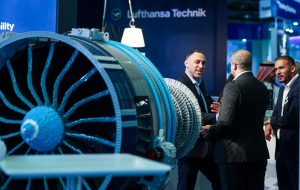DUBAI/ WAM
MRO Middle East and Aircraft Interiors Middle East (AIME) 2024 marked the largest edition to date, witnessing record-breaking attendance, significant deals and announcements and thought-provoking conference sessions.
The co-located events welcomed more than 8,000 attendees from 95 countries, 250 exhibitors and 120 airlines.
Some of the notable announcements included flyadeal signing a long-term agreement with Safran Nacelles, focusing on the comprehensive support of Nacelles for flyadeal’s Airbus A320neo family fleet, and Saudia Technic announcing a new service centre agreement with Airbus Helicopters.
Airbus and Beond also announced a new collaboration powered by Airbus’ Skywise Health Monitoring platform, while Mohammed Bin Rashid Aerospace Hub signed an agreement with ATS Technic to open its new facility in Dubai South, and Bossard Aerospace announced the renewal of its long-standing support agreement with Joramco.
Insightful conference sessions and workshops from industry experts continued during day two at the Go Live! Theatre and the On Board Hub. During the session titled “MRO: Are supply chain challenges opening the door to alternative parts?”, panellists discussed the biggest constraint to further the use of alternative parts in the Middle East, which a poll answer showed to be “contractual constraints, including leasing agreements”.
Jim O’Sullivan, VP Business Development at HEICO, said that since “contracts are written by lawyers who don’t have to work for the life of the aircraft maintenance, lessors need to speak to the lawyers and lessors to work out a value proposition. One size does not fit all – some parts may have even further restrictions. There should be a solution to this challenge since generally, a lessor does not want a surprise at the end of a lease – they want a smooth end and transaction.”
Ahmad Rajei, Senior Director of Design, Engineering and Innovation at Etihad Airways Engineering, said, “The understanding of operational demands needs to be considered – producing alternative parts have to be equal or better, they cannot get less. Safety concerns have to be prioritised. With the lack of components in the market, it is getting easier but a lot of work has to be done by local authorities to take responsibility to enhance the use of alternative parts.”
Meanwhile at the session titled “AIME: Future Digitised and Connected Cabin”, Verena Bintaro, Director of Marketing at AERQ, discussed how airlines can revolutionise passenger experience by delivering personalised content, which will in turn boost revenue and optimise operations. Bintaro commented, “We need to have an open platform where third parties and developers have access to create apps that are not limited to just one airline or aircraft… So it is about opening up the cabin for third parties and eventually passengers can make their time on board much more valuable.”
The co-located events concluded today at Dubai World Trade Centre (DWTC). The next edition of MRO Middle East and AIME will take place on 10th and 11th February, 2025.
 The Gulf Time Newspaper One of the finest business newspapers in the UAE brought to you by our professional writers and editors.
The Gulf Time Newspaper One of the finest business newspapers in the UAE brought to you by our professional writers and editors.
